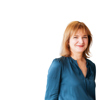
Director Sarah Deasley on building a successful career as a female economist
What first got you interested in economics?
I picked it as an A level because I liked both maths and English, and it sounded as though it would use a bit of both. My first lesson was about diminishing marginal utility and was illustrated through the mass consumption of Mars bars. I was immediately hooked (not to mention the sugar rush).
Can you talk us though your journey to becoming a director at Frontier?
I started as a government economist, and after about four years I switched to consulting with PwC. Then in 2002, PwC sold its consulting businesses to IBM. Waking up to discover that I worked for a large IT company was not the happiest morning of my life.
So I applied to join Frontier but didn’t make it past the interview. I was devastated. I went part-time and did a PhD, a decision that made me appreciate that I didn’t want to become an academic. And then, luckily, Frontier got in touch again to say that they would like to offer me a job.
Since arriving here my journey has been rather more straightforward. I progressed from consultant through to director in what now feels like seamless fashion – although I’m fairly certain it hasn’t always felt that way!
You’re an expert in the energy sector – was that always an ambition of yours?
Surprisingly, being an energy expert was not a childhood dream of mine. Instead I fell into it after being offered a job after university at the newly formed electricity regulator, the precursor to Ofgem. They were based in Birmingham, where I’d been to university and wanted to stay, so I took the job. Plus it was headed up by my former professor (see how it pays to be a diligent student?).
I then spent many years trying to work in other sectors before realising that energy was by far the most interesting one after all – there are so many important issues involved that economists are well placed to advise on.
What have been your career highlights so far?
Often the hardest projects turn out to be the most rewarding – and the hardest projects tend to be when you’re working on a high risk appeal, to a timeline determined by a court or the Competition and Markets Authority.
Working with both Phoenix Natural Gas and British Gas on successful price cap appeals are two that spring to mind, not least as they’re both long-standing clients who I’ve really enjoyed working with. I also hope that some of the work I’ve been involved in on the UK’s transition to net zero greenhouse gases has made a positive difference – that would be the best legacy.
As a woman in economics, what are some of the challenges you face? And any tips on how to overcome them?
I don’t think there are any inherent challenges that come with being a woman and an economist. But I do think that until you have a degree of equality in numbers, there is a risk that you can feel like the odd one out as a woman. That can bring challenges, particularly in consultancy where relationships are so important.
Almost everyone feels like this at some point though – and recognising it and searching for common ground can really help.
Did you have any female role models who also worked as economists?
I was lucky to have an excellent female role model very early in my career: Eileen Marshall was a lecturer of mine at Birmingham University and then one of the senior directors at Ofgem. She was a very good economist and fearless in the face of a male-dominated sector. Just as well, as moving into consultancy meant that I didn’t find another one for some time – in fact until I arrived at Frontier and met Sarah Hogg.
But the sector has made significant progress since then, and a number of my peers have gone on to become great role models for the next generation: Rachel Fletcher at Ofwat, Joanna Whittington at BEIS and Cloda Jenkins at UCL, to name just three of them.
What does the future hold for women in economics? What has improved and what still needs work?
I would hope that the future for women in economics is really positive – it offers a fascinating career that would benefit from having a greater diversity of voice in its future development. There is much greater recognition of this now and more conscious decisions are being taken about how to achieve it.
For me the most important aspect to get right is to enable effective flexible working – the more we can make this ‘normal’, the greater the chance of retaining women (and men), whatever the choices they wish to make about how much (or little) time they wish to spend at work.
What advice would you give to someone who is just starting out in their career as an economist?
Try lots of different things. Work out what really motivates you. Don’t be afraid to change course. Don’t compare yourself to others. And don’t be afraid to ask for help and advice.




